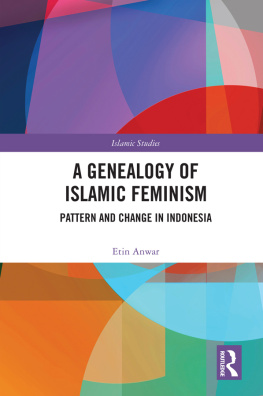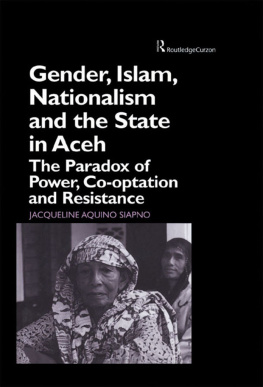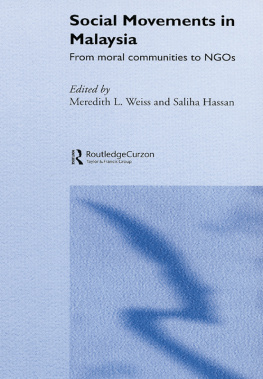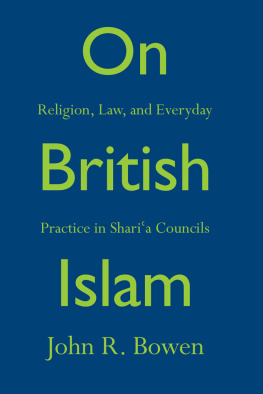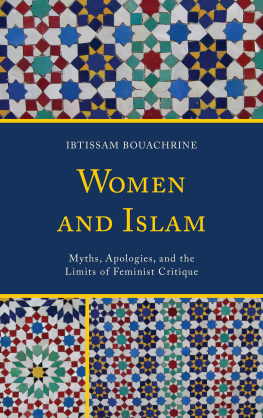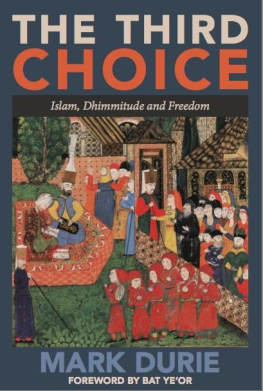Women and Sharia Law in Northern Indonesia
This book examines the life of women in the Indonesian province of Aceh, where Islamic law was introduced in 1999. It outlines how women have had to face the formalization of conservative understandings of sharia law in regulations and new state institutions over the last decade or so, how they have responded to this, forming non-governmental organizations (NGOs) that have shaped local discourse on womens rights, equality and status in Islam, and how these NGOs have strategized, demanded reform and enabled Acehnese women to take active roles in influencing the processes of democratization and Islamization that are shaping the province. The book shows that although the formal introduction of Islamic law in Aceh has placed restrictions on womens freedom, paradoxically it has not prevented them from engaging in public life. It argues that the democratization of Indonesia, which allowed Islamization to occur, continues to act as an important factor shaping Islamizations current trajectory; that the introduction of Islamic law has motivated womens NGOs and other elements of civil society to become more involved in wider discussions about the future of sharia in Aceh; and that Indonesias recent decentralization policy and growing local Islamism have enabled the emergence of different religious and local adat practices, which do not necessarily correspond to overall national trends.
Dina Afrianty is a researcher at the Institute for Religion, Politics and Society, Australian Catholic University and affiliated with Syarif Hidayatullah State Islamic University, Indonesia.
Asian Studies Association of Australia
Women in Asia Series
Editor: Louise Edwards (University of New South Wales)
Editorial Board:
Susan Blackburn (Monash University)
Hyaeweol Choi (The Australian National University)
Michele Ford (The University of Sydney)
Trude Jacobsen (Northern Illinois University)
Vera Mackie (University of Wollongong)
Anne McLaren (The University of Melbourne)
Mina Roces (University of New South Wales)
Dina Siddiqi (The City University of New York)
Andrea Whittaker (The University of Queensland)
Mukkuvar Women: Gender, Hegemony and Capitalist Transformation in a South Indian Fishing Community by Kalpana Ram 1991
A World of Difference: Islam and Gender Hierarchy in Turkey by Julie Marcus 1992
Purity and Communal Boundaries: Women and Social Change in a Bangladeshi Village by Santi Rozario 1992
Madonnas and Martyrs: Militarism and Violence in the Philippines by Anne-Marie Hilsdon 1995
Masters and Managers: A Study of Gender Relations in Urban Java by Norma Sullivan 1995
Matriliny and Modernity: Sexual Politics and Social Change in Rural Malaysia by Maila Stivens 1995
Intimate Knowledge: Women and their Health in North-east Thailand by Andrea Whittaker 2000
Women in Asia: Tradition, Modernity and Globalisation by Louise Edwards and Mina Roces (eds) 2000
Violence against Women in Asian Societies: Gender Inequality and Technologies of Violence by Lenore Manderson and Linda Rae Bennett (eds) 2003
Womens Employment in Japan: The Experience of Part-time Workers by Kaye Broadbent 2003
Chinese Women Living and Working by Anne McLaren (ed) 2004
Abortion, Sin and the State in Thailand by Andrea Whittaker 2004
Sexual Violence and the Law in Japan by Catherine Burns 2004
Women, Islam and Modernity: Single Women, Sexuality and Reproductive Health in Contemporary Indonesia by Linda Rae Bennett 2005
The Womens Movement in Post-Colonial Indonesia by Elizabeth Martyn 2005
Women and Work in Indonesia by Michele Ford and Lyn Parker (eds) 2008
Women and Union Activism in Asia by Kaye Broadbent and Michele Ford (eds) 2008
Gender, Islam, and Democracy in Indonesia by Kathryn Robinson 2008
Sex, Love and Feminism in the Asia Pacific: A Cross-Cultural Study of Young
Peoples Attitudes by Chilla Bulbeck 2008
Gender, State and Social Power: Divorce in Contemporary Indonesia by Kate OShaughnessy 2008
Gender, Household, and State in Post-Revolutionary Vietnam by Jayne Werner 2008
Young Women in Japan: Transitions to Adulthood by Kaori Okano 2009
Women, Islam and Everyday Life: Renegotiating Polygamy in Indonesia by Nina Nurmila 2009
Feminist Movements in Contemporary Japan by Laura Dales 2009
Gender and Labour in Korea and Japan: Sexing Class by Ruth Barraclough and Elyssa Faison (eds) 2009
Gender Diversity in Indonesia: Sexuality, Islam and Queer Selves by Sharyn Graham Davies 2010
New Women in Colonial Korea: A Sourcebook by Hyaeweol Choi 2012
Women Writers in Postsocialist China by Kay Schaffer and Xianlin Song 2013
Domestic Violence in Asia: Globalization, Gender and Islam in the Maldives by Emma Fulu 2014
Gender and Power in Indonesian Islam: Leaders, Feminists, Sufis and Pesantren Selves by Bianca J. Smith and Mark Woodward (eds) 2014
Practicing Feminism in South Korea: The Womens Movement against Sexual Violence by Kyungja Jung 2014
The Korean Womens Movement and the State: Bargaining for Change by Seung-kyung Kim 2014
Gender, Nation and State in Modern Japan by Andrea Germer, Vera Mackie and Ulrike Whr (eds) 2014
Women and Sex Work in Cambodia: Blood, Sweat and Tears by Larissa Sandy 2015
Growing up Female in Multi-Ethnic Malaysia by Cynthia Joseph 2015
Women, Sexual Violence and the Indonesian Killings of 196566 by Annie Pohlman
Love and Marriage in Globalising China by Wang Pan 2015
Women and Climate Change in Bangladesh by Margaret Alston 2015
Women and Politics in Contemporary Japan by Emma Dalton 2015
Trafficking Women in Korea: Filipina Migrant Entertainers by Sallie Yea 2015
Women and Sharia Law in Northern Indonesia by Dina Afrianty 2015
Chinas Leftover Women: Late Marriage among Professional Women and its Consequences by Sandy To 2015
Series Editors foreword
The contributions of women to the social, political and economic transformations occurring in the Asian region are legion. Women have served as leaders of nations, communities, workplaces, activist groups and families. Asian women have joined with others to participate in fomenting change at micro and macro levels. They have been both agents and targets of national and international interventions in social policy. In the performance of these myriad roles women have forged new and modern gendered identities that are recognisably global and local. Their experiences are rich, diverse and instructive. The books in this series testify to the central role women play in creating the new Asia and re-creating Asian womanhood. Moreover, these books reveal the resilience and inventiveness of women around the Asian region in the face of entrenched and evolving patriarchal social norms.
Scholars publishing in this series demonstrate a commitment to promoting the productive conversation between Gender Studies and Asian Studies. The need to understand the diversity of experiences of femininity and womanhood around the world increases inexorably as globalization proceeds apace. Lessons from the experiences of Asian women present us with fresh opportunities for building new possibilities for womens progress the world over.


